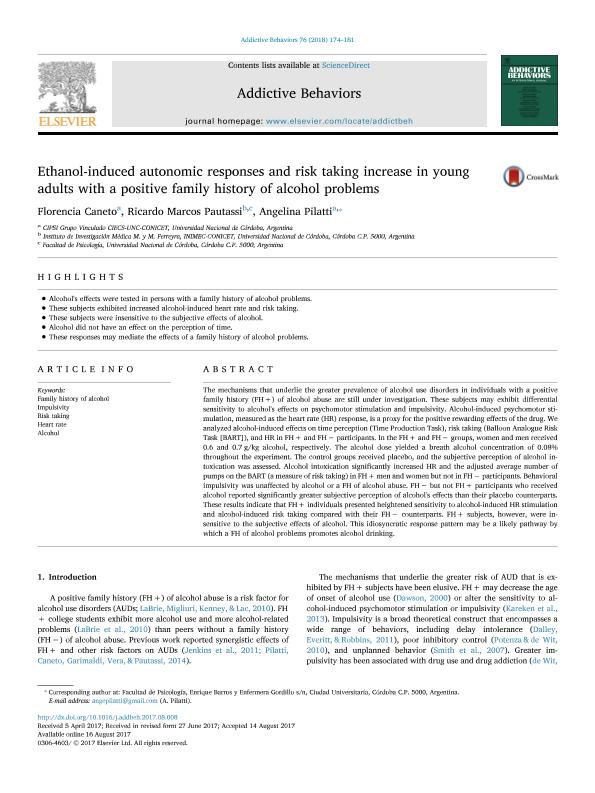Mostrar el registro sencillo del ítem
dc.contributor.author
Caneto, Florencia

dc.contributor.author
Pautassi, Ricardo Marcos

dc.contributor.author
Pilatti, Angelina

dc.date.available
2019-12-16T13:14:24Z
dc.date.issued
2018-01
dc.identifier.citation
Caneto, Florencia; Pautassi, Ricardo Marcos; Pilatti, Angelina; Ethanol-induced autonomic responses and risk taking increase in young adults with a positive family history of alcohol problems; Pergamon-Elsevier Science Ltd; Addictive Behaviors.; 76; 1-2018; 174-181
dc.identifier.issn
0306-4603
dc.identifier.uri
http://hdl.handle.net/11336/92239
dc.description.abstract
The mechanisms that underlie the greater prevalence of alcohol use disorders in individuals with a positive family history (FH +) of alcohol abuse are still under investigation. These subjects may exhibit differential sensitivity to alcohol´s effects on psychomotor stimulation and impulsivity. Alcohol-induced psychomotor stimulation, measured as the heart rate (HR) response, is a proxy for the positive rewarding effects of the drug. We analyzed alcohol-induced effects on time perception (Time Production Task), risk taking (Balloon Analogue Risk Task [BART]), and HR in FH + and FH − participants. In the FH + and FH − groups, women and men received 0.6 and 0.7 g/kg alcohol, respectively. The alcohol dose yielded a breath alcohol concentration of 0.08% throughout the experiment. The control groups received placebo, and the subjective perception of alcohol intoxication was assessed. Alcohol intoxication significantly increased HR and the adjusted average number of pumps on the BART (a measure of risk taking) in FH + men and women but not in FH − participants. Behavioral impulsivity was unaffected by alcohol or a FH of alcohol abuse. FH − but not FH + participants who received alcohol reported significantly greater subjective perception of alcohol´s effects than their placebo counterparts. These results indicate that FH + individuals presented heightened sensitivity to alcohol-induced HR stimulation and alcohol-induced risk taking compared with their FH − counterparts. FH + subjects, however, were insensitive to the subjective effects of alcohol. This idiosyncratic response pattern may be a likely pathway by which a FH of alcohol problems promotes alcohol drinking.
dc.format
application/pdf
dc.language.iso
eng
dc.publisher
Pergamon-Elsevier Science Ltd

dc.rights
info:eu-repo/semantics/openAccess
dc.rights
Atribución-NoComercial-CompartirIgual 2.5 Argentina (CC BY-NC-SA 2.5 AR)
dc.rights.uri
https://creativecommons.org/licenses/by-nc-sa/2.5/ar/
dc.subject
ALCOHOL
dc.subject
FAMILY HISTORY OF ALCOHOL
dc.subject
HEART RATE
dc.subject
IMPULSIVITY
dc.subject
RISK TAKING
dc.subject.classification
Otras Psicología

dc.subject.classification
Psicología

dc.subject.classification
CIENCIAS SOCIALES

dc.title
Ethanol-induced autonomic responses and risk taking increase in young adults with a positive family history of alcohol problems
dc.type
info:eu-repo/semantics/article
dc.type
info:ar-repo/semantics/artículo
dc.type
info:eu-repo/semantics/publishedVersion
dc.date.updated
2019-10-23T14:25:40Z
dc.journal.volume
76
dc.journal.pagination
174-181
dc.journal.pais
Estados Unidos

dc.description.fil
Fil: Caneto, Florencia. Universidad Nacional de Córdoba; Argentina. Consejo Nacional de Investigaciones Científicas y Técnicas. Centro Científico Tecnológico Conicet - Córdoba. Centro de Investigaciones y Estudio sobre Cultura y Sociedad. Centro de Investigaciones de la Facultad de Psicología - Grupo Vinculado CIPSI; Argentina
dc.description.fil
Fil: Pautassi, Ricardo Marcos. Consejo Nacional de Investigaciones Científicas y Técnicas. Centro Científico Tecnológico Conicet - Córdoba. Instituto de Investigación Médica Mercedes y Martín Ferreyra. Universidad Nacional de Córdoba. Instituto de Investigación Médica Mercedes y Martín Ferreyra; Argentina
dc.description.fil
Fil: Pilatti, Angelina. Universidad Nacional de Córdoba; Argentina. Consejo Nacional de Investigaciones Científicas y Técnicas. Centro Científico Tecnológico Conicet - Córdoba. Centro de Investigaciones y Estudio sobre Cultura y Sociedad. Centro de Investigaciones de la Facultad de Psicología - Grupo Vinculado CIPSI; Argentina
dc.journal.title
Addictive Behaviors.

dc.relation.alternativeid
info:eu-repo/semantics/altIdentifier/url/https://www.sciencedirect.com/science/article/pii/S0306460317302976
dc.relation.alternativeid
info:eu-repo/semantics/altIdentifier/doi/http://dx.doi.org/10.1016/j.addbeh.2017.08.008
Archivos asociados
